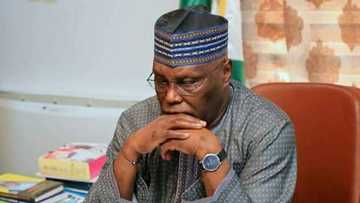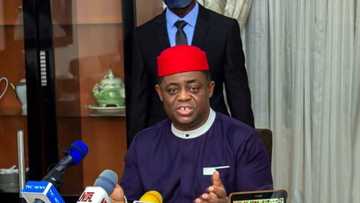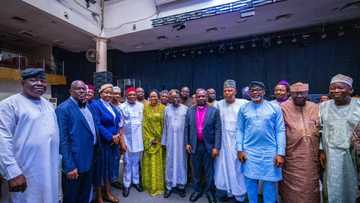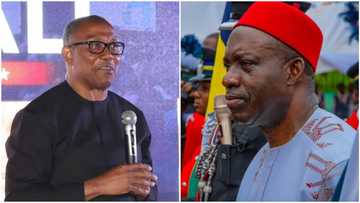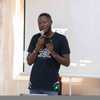Beyond Deeper Life Church: Ifa Priest Oluwo Olakunle Addresses Negative Stereotypes about African Spirituality
Like a steady rise of bubbles in the thin air, Olakunle Olawole did not just become an Ifa priest —Oluwo. His journey into the deep knowledge of African spirituality started as a response to the dangling question of self-discovery.
PAY ATTENTION: Click “See First” under the “Following” tab to see Legit.ng News on your Facebook News Feed!
The trigger was not to challenge what he was born with as a belief in Christianity’s Holy Trinity of God, but to seek beyond it —and probably create a unique path for himself.
This discovery first began as a spark of fire, then an ember, then an inferno of spiritual connection and established reality.
Fast forward to 2022, Olakunle has placed his Deeper Christian Life Ministry background behind him and is now putting people, especially youths like him, on the map of their spiritual discovery through Ifa.
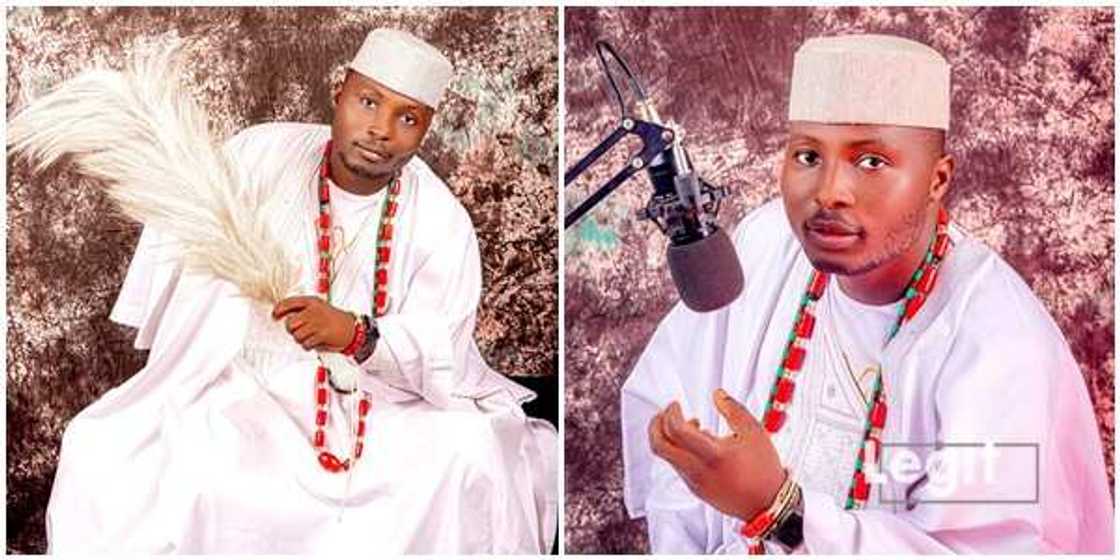
Source: Original
In this interview with LEGIT.ng, Oluwo Olakunle provides responses that may correct the negative stereotypes about African spirituality.
PAY ATTENTION: Subscribe to Digital Talk newsletter to receive must-know business stories and succeed BIG!
You seem to have tasted wine from two different cups. Who is Oluwo Olakunle in full?
Oluwo Olakunle Olawole is my name. I am a young Ifa priest, tech enthusiast and global change maker using the knowledge of Ifa and the Orisa (gods) to positively impact young people in society.
I am the host of Africa’s first Afrofuturist Podcast, #IheifaPriestPodcast, an insightful podcast aimed at correcting the negative stereotypes about African spirituality. Also, I am a fellow of the CGPIT Center for Global Polytheist and Indigenous Tradition in India; and a former national youth leader of the KOWA party in Nigeria.
Fondly called MKO, I was a member of the student representative council at Yaba College of Technology ’14. In my soon-to-be-published book “IFA, AFRO-FUTURISM AND TECH, “I argued that Intergenerational dialogue is needed to sustain indigenous science to advance society.

Read also
Son of popular northern governor wants death sanction for World Cup fans sneaking alcohol to stadiums
You’re one of the young priests proudly projecting Ifa divinity; why should someone study and believe in Ifa?
Ifa is a knowledge-based portal, an advanced query system applicable to all aspects of society. Having survived the test of time and the many stereotypes, the potency of the knowledge is unmatched. As against public belief, we all do not need to become a Babalawo “master of mysteries” in the study of Ifa as the knowledge is readily available and useful in all fields of society irrespective of our diverse ideas and understandings.
There are so many stumbling blocks impeding the presence of young, vibrant people from publicly associating with a religious system such as Ifa worship. Although not that I would say that young people are not within the space, young people and, in fact, Africans generally would not just associate with the system because of the negative stereotypes attached to the system.

Read also
Youths shine in BUS public speaking competition with speeches about Materialism, share over N300k
What differentiates Ifa priests from other worshipers, and what unique peculiarity does Ifa share with other traditional religions?
Ifa explains allegorically in one of the verses of the sacred odus;
Awọn alagbara ni n ja ogun fun Ọba
Awọn eniyan barabara ni n ṣe iṣẹ agbẹ
Ẹni to ba ni iye de inu ni n ṣiṣẹ Babalawo
Ẹni ọrọ dun ladunju ni n ṣe awo Ajẹ
“Ẹni to ba ni iye de inu ni n ṣiṣẹ Babalawo” translates to one’s quality of logic and critical reasoning, which invariably explains precisely who qualifies to be called an Ifa priest in the contemporary world. A priest is a knowledge paradox whose views on the different aspects of nature are mostly divergent, yet determined in his resolve by providing solutions to the problems he is confronted with.
As against other religions, Ifa explains historically, through the interpretation of our sacred literary corpus, the relationship between the numerous energies of nature. As a religion, the tenet of nature hinged on the principle of love and truth is a generality in all religions.
What’s Ifa’s understanding of Ori, destiny?
The Yoruba adage” Ori ni Ọba ara” is a testament to how important the Ori is in the schematics of our lives.
Ori, being man’s point of access to the cosmic or spiritual realm, is an important aspect of African spirituality that has to be understood in our journey to self-discovery.
However, Ifa explains the link between one’s Ori as a spiritual guardian and nature. In my podcast, “The Ifa Priest Podcast”, There’s an Episode titled; “Ori and Man’s encounter with spirituality” that explains Ori deeply as our unique spiritual identity and database through which every life event unfolds.
Does worshipping Ifa make someone Babalawo or Onisegun -- what is the difference between the two?
Worshipping Ifa makes you a believer, and eventually becoming Babalawo results from a much more advanced level of study. Many practitioners are not certified to be called a Babalawo or Onisegun by virtue of training.
An Ifa priest (Baba gbogbo Alawo) is supposed to be the father of mysteries, a philosopher, a change maker, a researcher, a natural scientist, a programmer, a talent manager, a counsellor and many other things. A Babalawo is the interpreter who decodes the programming languages of nature while linking the energies that flow through nature with man.
An Onisegun is an advanced Adahunse, in that he or she having developed an interest in the general knowledge of herbs, seeks to know more about herbs in a more professional way. He or she is proficient in the knowledge of herbs and roots.
The rise in yahoo yahoo menace has popularised the term “Ose, Oshole,” does bathing ‘soap’ actually bring money? Do money rituals exist in Ifa divinity?
Like I used to tell people that Oògùn works on the principle of energy conversion that states “energy cannot be created nor destroyed but can be transferred from one medium to another.” When soap is done to accumulate the positive energy of attraction, it could nevertheless also be directed to only attract financial opportunities. That explains how this soap works. However, you must work to earn a living or to make money; therefore, the Oògùn or ọṣẹ oṣolẹ does not bring money to your doorstep; it helps to attract positive opportunities in line with your line of work.
Money ritual does not exist in Ifa.
As an Ifa priest, how do you think the bond of religious harmony can be strengthened in a religiously pluralised society like ours?
First, you need to know that religious harmony had been the core value of our society and even as practitioners of Ifa and the enablers or “Iwa Pẹlẹ”,.
Ifa says in Otura Ọwọnrin:
"Konile gbe ina woju alejo,
Ki alejo gbe ina woju onile,
Adifa fun Alaketu wọn ni ko rubọ aiku fun Anwa ọmọ rẹ."
Ifa has outlined that for harmony to exist, we must first understand each other. Harmony rides on the template of understanding; as such, we must study ourselves beyond the news we hear about different religions for acceptance.
Tell us more about the Ifa and Orisa school of studies.
SIOS is a frontline non-profit cultural hub of changemakers, committed to the promotion of African culture with a focus on in-depth research, providing critical analysis on key issues bothering culture and African spirituality, crafting practical solutions through training and programs that would empower all gender with the knowledge of our indigenous faith.
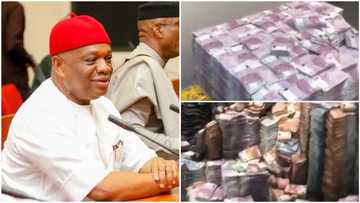
Read also
Video shows serving senator from southeast state hiding stacks of money in his house? Fact emerges
We are currently receiving applications to learn, connect and grow in the knowledge of African spirituality through Ifa and the Orisas in a simplified manner. We are organising the “Ifa, and Orisa Masterclass 2022 themed: “Understanding Ifa and Orisa in the new age.” It is a day training program designed by THE IFA PRIEST SCHOOL OF IFA AND ORISA STUDIES (SIOS) at the Institute of Africa and Diaspora studies;= at the University of Lagos. The masterclass, whose date is Tuesday, November 22, 2022, is scheduled to host the following events.
Training would be conducted by verified and astute professionals in their respective fields.
Do you think traditionalists enjoy the same protection as Muslims and Christians?
No, we don’t.
Source: Legit.ng



